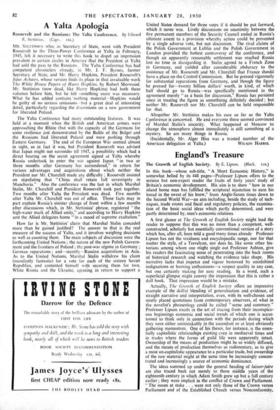A Yalta .Apologia
Roosevelt and the Russians: The Yalta Conference. By Edward
MR. STE-I-m[0s who, as Secretary of State, went with President Roosevelt to the Three-Power Conference at Yalta in February, 1945, felt it necessary to write this book to dispel an impression prevalent in certain circles in America-that the President at Yalta had sold the pass to the Russians. The Yalta Conference has had competent chroniclers already, in Mr. J. F. Byrnes, former Secretary of State, and Mr. Harry Hopkins, President Roosevelt's fidus Achates, whose version finds its place in that invaluable work The White House Papers of Harry Hopkins. by Robert Sherwood. Mr. Stettinius (now dead, like Harry Hopkins) had both these volumes before him, but he felt something more was necessary. What he has added contains -nothing material—Hopkins would be guilty of no serious omissions—but a great deal of interesting detail, particularly regarding the discussions on a new government for liberated Poland.
The Yalta Conference had many outstanding features. It was held at a moment when the British and American armies were approaching the Rhine (but with the capacity of the Germans for some resilience just demonstrated by the Battle of the Bulge) and the Russians had liberated Poland and were pushing through Eastern Germany. The end of the European War seemed almost in sight, as in fact it was, but President Roosevelt was advised that Japan might not surrender till 1947, a possibility which had a direct bearing on the secret agreement signed at Yalta whereby Russia undertook to enter the war against Japan " in two or three months after Germany has surrendered," in return for various advantages and acquisitions about which neither the President nor Mr. Churchill made any difficulty ; Roosevelt insisted on stipulating that " China shall retain full sovereignty in Manchuria." Also the conference was the last in which Marshal Stalin, Mr. Churchill and President Roosevelt took part together. Two months after Yalta the President was dead. Five months after Yalta Mr. Churchill was out of office. Those facts may in part explain Russia's sinister change of front within a few months after discussions which, in Mr. Stettinius' phrase, registered " the high-water mark of Allied unity," and according to Harry Hopkins sent the Allied delegates home " in a mood of supreme exaltation."
How far is Mr. Stettinius' claim that Marshal Stalin conceded more than he gained justified? The answer to that is the real measure of the success of Yalta, and it involves weighing decisions as well as counting them. The main subjects of discussion were the forthcoming United Nations ; the nature of the new Polish Govern- ment and the frontiers of Poland ; the post-war regime in Germany.; German reparations ; and—secretly—Russian acquisitions in Asia. As to the United Nations, Marshal Stalin withdrew his claim (manifestly fantastic) for a vote for each of the sixteen Soviet Republics, and contented himself with securing them for two, White Russia and the Ukraine, agreeing in return to support a
United States demand for three votes if it should be put forward, which it never was. Lively discussions on unanimity between the five permanent members of the Security Council ended in Russia's ultimate assent to a provision whereby action could be prevented by a single adverse vote, but not discussion. The rival claims of the Polish Government at Lublin and the Polish Government in London provided the hottest controversy of the conference, and though an apparently reasonable settlement was reached Russia lost no time in disregarding it. Stalin _agreed to a French Zone in Germany, and yielded after considerable obduracy to the insistence of Mr. Roosevelt and Mr. Churchill that France should have a place on the Control Commission. But he pressed vigorously for substantial reparations from Germany, and though the figure he pressed for—twenty billion dollars' worth, in kind, of which half should go to Russia—was specifically mentioned in the agreement merely " as a basis for discussion," Russia has persisted since in treating the figure as somethinng definitely decided ; but neither Mr. Roosevelt nor Mr. Churchill can be held responsible for that.
Altogether Mr. Stettinius makes his case so far as the Yalta Conference is concerned. He and everyone there seemed convinced of Marshal Stalin's sincerity. What happened at Moscow to change the atmosphere almost immediately is still something of a mystery. So are many things in Russia.
(Incidentally, Mr. Alger Hiss was a trusted member of the


































 Previous page
Previous page